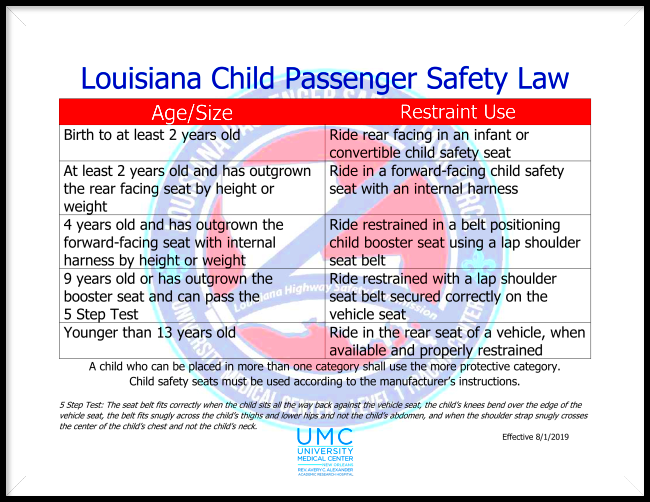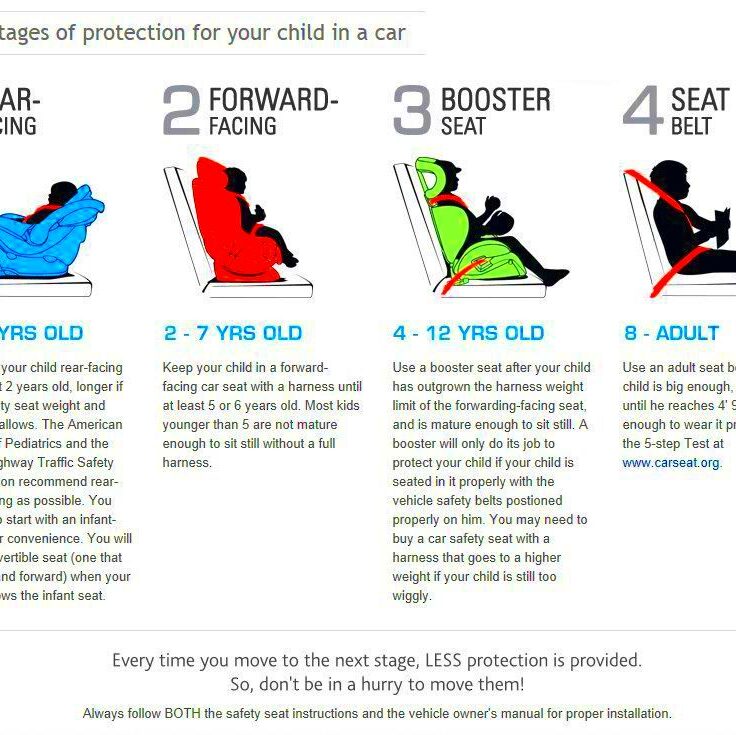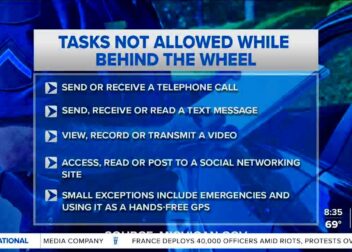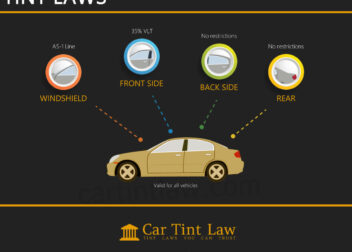Car Seat Safety Laws in Louisiana Explained
Car seat safety is a critical topic for parents and guardians in Louisiana. Understanding the laws surrounding car seat use can help ensure the safety of children during travel. In Louisiana, specific regulations aim to protect young passengers, making it essential for families to be informed about these guidelines.
Importance of Car Seat Safety

Car seat safety is vital for several reasons:
- Protection in Accidents: Properly used car seats significantly reduce the risk of injury or death in crashes.
- Developmental Needs: Children have different physical needs as they grow, and using the right car seat helps accommodate these changes.
- Legal Compliance: Following state laws helps avoid fines and legal issues while ensuring child safety.
- Peace of Mind: Knowing your child is secure allows for a more relaxed driving experience.
Statistics show that car seats can reduce the risk of fatal injury by 71% for infants and 54% for toddlers in passenger cars. It is essential for caregivers to stay informed about the latest safety recommendations to ensure their children are protected on the road.
Overview of Louisiana Car Seat Laws
Louisiana has specific car seat laws designed to enhance the safety of children in vehicles. Here’s a breakdown of the key points:
| Age Group | Type of Car Seat Required | Weight Limit |
|---|---|---|
| Infants (0-1 years) | Rear-facing car seat | Up to 35-40 lbs |
| Toddlers (1-4 years) | Forward-facing car seat with harness | Up to 65 lbs |
| Children (4-8 years) | Booster seat | Over 40 lbs but under 4’9” tall |
| Children (8 years and older) | Seat belt | Must be tall enough for proper fit |
It is important to note that Louisiana law mandates children under the age of 13 to ride in the back seat whenever possible. Ensuring that your car seat meets these requirements can help keep your child safe and compliant with the law.
Types of Car Seats and Their Uses
When it comes to car seats, knowing which type to use for your child is essential. Each car seat serves a specific purpose based on a child’s age, weight, and developmental needs. Here’s a breakdown of the main types:
- Rear-Facing Car Seats: These are designed for infants and toddlers and should be used until your child reaches the maximum weight or height limit specified by the manufacturer. They provide crucial support for a child’s head, neck, and spine in case of a collision.
- Forward-Facing Car Seats: Once your child outgrows their rear-facing seat, they can transition to a forward-facing car seat with a harness. This type is suitable for toddlers and preschoolers and should be used until they reach the weight or height limit.
- Booster Seats: For older children who have outgrown their forward-facing car seat, a booster seat helps position the vehicle’s seat belt correctly across their body. Booster seats are typically used until the child is around 4’9” tall.
- Seat Belts: Once children are tall enough to fit the seat belt properly without a booster, they can use the seat belt alone. It’s crucial that the lap belt lies low across the hips and the shoulder belt fits snugly across the chest.
Using the correct car seat type ensures that your child is safely secured while traveling, making it vital for every parent to understand these options.
Age and Weight Requirements for Car Seats
Age and weight requirements for car seats are crucial guidelines that help keep children safe in vehicles. Here’s a closer look at the recommended limits:
| Age Group | Type of Car Seat | Weight Range |
|---|---|---|
| Infants (0-1 years) | Rear-facing car seat | Up to 35-40 lbs |
| Toddlers (1-4 years) | Forward-facing car seat with harness | Up to 65 lbs |
| Children (4-8 years) | Booster seat | Over 40 lbs but under 4’9” tall |
| Children (8 years and older) | Seat belt | Must fit correctly |
These guidelines are based on safety studies and provide a framework to ensure that children are protected as they grow. Always check the manufacturer’s instructions for specific weight limits, as they can vary between different car seat brands.
Exceptions to Car Seat Laws in Louisiana
While car seat laws in Louisiana are designed to enhance child safety, there are a few exceptions that parents should be aware of:
- Medical Exemptions: If a child has a medical condition that prevents them from using a standard car seat, a doctor’s note may be required to exempt them from the usual requirements.
- Vehicle Limitations: In some cases, certain vehicles, like vans or buses, may have different requirements due to space constraints. Always check your vehicle’s manual for guidance.
- Ride Sharing Services: When using ride-sharing services, it’s essential to check if the driver has appropriate car seats available, as regulations may vary.
- Short Trips: While it’s not advisable, some parents may choose not to use a car seat for very short trips. However, experts strongly recommend that children always use the appropriate car seat, regardless of trip length.
Understanding these exceptions can help parents make informed decisions while ensuring that their children remain as safe as possible on the road.
Common Mistakes Parents Make with Car Seats
When it comes to car seat safety, even well-meaning parents can make mistakes. Here are some common errors that can compromise a child’s safety:
- Incorrect Installation: Many parents don’t install car seats correctly. Always refer to the manufacturer’s instructions and consider having it checked by a certified technician.
- Using the Wrong Type of Seat: Transitioning to a new car seat too early can be dangerous. Make sure to follow the age and weight requirements for each seat type.
- Not Securing the Harness Properly: Loose harness straps can lead to injuries in a crash. The straps should be snug and positioned correctly on the child’s shoulders.
- Forward-Facing Too Soon: Children should remain in rear-facing seats as long as possible. Switching them too early increases the risk of severe injury in an accident.
- Using Expired Car Seats: Car seats have expiration dates, and using an expired seat can be unsafe due to wear and tear over time.
- Riding with Unbuckled Seats: It’s crucial to buckle car seats securely when not in use to prevent them from becoming projectiles in an accident.
By avoiding these common mistakes, parents can significantly enhance the safety of their children during travel.
Resources for Car Seat Safety in Louisiana
There are numerous resources available for parents looking to ensure car seat safety in Louisiana. Here are some helpful options:
- Louisiana Department of Transportation and Development: This department provides guidelines and information about car seat laws and safety tips.
- National Highway Traffic Safety Administration (NHTSA): Their website offers a wealth of resources on car seat safety, including installation guides and safety checks.
- Local Health Departments: Many local health departments offer car seat safety classes or events where parents can learn proper installation techniques.
- Certified Child Passenger Safety Technicians: These professionals can help parents with car seat installation and provide personalized advice based on your child’s needs.
- Online Car Seat Check Tools: Websites like NHTSA’s “Find a Car Seat Check Event” help locate nearby events where parents can have their car seats inspected for free.
Utilizing these resources can empower parents to make informed decisions regarding car seat safety and compliance with state laws.
Frequently Asked Questions about Car Seat Safety Laws
Here are some frequently asked questions that many parents have about car seat safety laws in Louisiana:
- What is the law regarding rear-facing car seats?
Louisiana law requires children to remain in a rear-facing car seat until they are at least 1 year old and weigh at least 35 pounds. - When can my child switch to a booster seat?
Children can switch to a booster seat when they outgrow their forward-facing car seat, typically around 4 years old and at least 40 pounds. - Are there any penalties for not following car seat laws?
Yes, failing to comply with car seat laws can result in fines and other penalties, plus increased risk to your child’s safety. - How can I ensure my car seat is installed correctly?
Refer to the car seat manufacturer’s instructions and consider attending a local car seat check event for professional assistance. - Can I use a second-hand car seat?
It’s best to avoid using a second-hand car seat unless you know its history. Check for expiration dates, recalls, and any signs of damage.
Addressing these questions can help clarify some common concerns, ensuring parents feel more confident in their understanding of car seat safety laws.
Conclusion on Car Seat Safety in Louisiana
Car seat safety is a crucial aspect of child passenger safety in Louisiana. Understanding the laws and guidelines can significantly reduce the risk of injury in the event of an accident. By choosing the appropriate car seat type, adhering to age and weight requirements, and avoiding common mistakes, parents can ensure their children are well protected. Additionally, utilizing available resources can further enhance knowledge and confidence in car seat safety practices. Prioritizing the correct use of car seats not only keeps children safe but also promotes peace of mind for parents during every journey.


